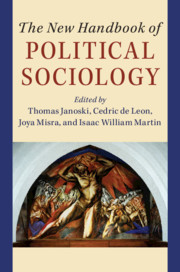Book contents
- The New Handbook of Political Sociology
- The New Handbook of Political Sociology
- Copyright page
- Dedication
- Contents
- Tables
- Figures
- Contributors
- Acknowledgments
- Introduction
- I Theories of Political Sociology
- II Media Explosion, Knowledge as Power, and Demographic Reversals
- III The State and Its Political Organizations
- IV Civil Society: The Roots and Processes of Political Action
- V Established and New State Policies and Innovations
- 30 The Evolution of Fiscal and Monetary Policy
- 31 Welfare State Policies and Their Effects
- 32 Sexuality, Gender, and Social Policy
- 33 Migration, Asylum, Integration, and Citizenship Policy
- 34 Cosmopolitanism and Political Sociology
- 35 War, States, and Political Sociology
- VI Globalization and New and Bigger Sources of Power and Resistance
- Index
- References
33 - Migration, Asylum, Integration, and Citizenship Policy
from V - Established and New State Policies and Innovations
Published online by Cambridge University Press: 22 February 2020
- The New Handbook of Political Sociology
- The New Handbook of Political Sociology
- Copyright page
- Dedication
- Contents
- Tables
- Figures
- Contributors
- Acknowledgments
- Introduction
- I Theories of Political Sociology
- II Media Explosion, Knowledge as Power, and Demographic Reversals
- III The State and Its Political Organizations
- IV Civil Society: The Roots and Processes of Political Action
- V Established and New State Policies and Innovations
- 30 The Evolution of Fiscal and Monetary Policy
- 31 Welfare State Policies and Their Effects
- 32 Sexuality, Gender, and Social Policy
- 33 Migration, Asylum, Integration, and Citizenship Policy
- 34 Cosmopolitanism and Political Sociology
- 35 War, States, and Political Sociology
- VI Globalization and New and Bigger Sources of Power and Resistance
- Index
- References
Summary
Migration studies focuses on people who cross international borders that delimit sovereign states. After crossing, migrants come to hold diverse legal statuses, ranging from naturalized citizens to those without papers. This status affects their access to rights, services, and benefits. Migration status also shapes people’s relations with government, their interactions with other people and institutions in society, and their sense of membership in the receiving community. Researchers who study migration must therefore understand the political sociology of states, power, and law.
- Type
- Chapter
- Information
- The New Handbook of Political Sociology , pp. 880 - 908Publisher: Cambridge University PressPrint publication year: 2020
References
- 2
- Cited by

